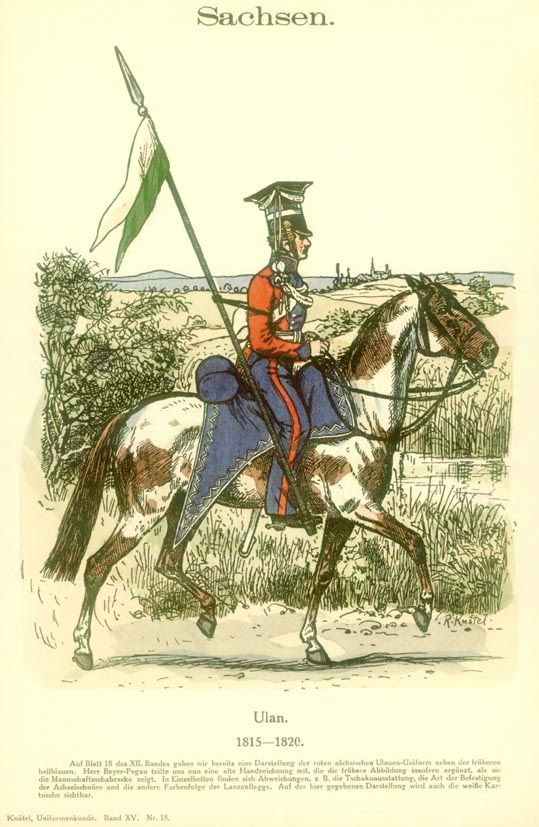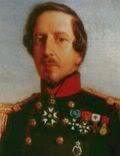Stnylan,
Thank you for your kind comments! I happen to have arrived this morning with just such an excerpt in hand...

From the Memoirs of a Prussian Royal Uhlan, pub. 1856 by Kapitan Franziske Grzybowski
Advance scouting was always a pleasure for me. It took me and my precious horse, Skoczek (Sko-chek: Springer), away from the stink of the camp and removed me from the overbearing supervision of my Prussian commanders. The cool breeze caught the smell of the firs on this day, and there was the crisp sound of a forest in winter. That morning was too peaceful for the trees to harbor Austrians. The few people to be seen, living in tiny huts in the hills overlooking Cieszyn, were Germans or Poles, who were as likely friendly as indifferent. It was a pleasure to be abroad that morning.
In the event, it was not a particularly treacherous incline. There was certainly no reason why I should have seen misfortune at this stream, rather than on any of the several mountainsides I’d traversed in recent days.
In one instant, I felt an instinctive sense of danger. Surely the mind’s eye of an experienced cavalry officer saw what my vision did not. In any case, I felt Skoczek’s hoof go out from under her, tripped by a root or a patch of snowy mud. And then we were on a wild ride down the slope. She frantically tried to find a footing that was not there. Oddly, my concern was mostly for her. She was not just my companion, since long before I joined the uhlans. To a cavalry soldier, a horse is a more important part of one’s equipment than a lance or a sword. Without her, I became just another soldier, lost and far from camp.
Inevitably, I heard a joint tear, and a bone break. We both went down, and slid the rest of the way. It certainly seemed that my leg had broken from her weight upon it, though remarkably that turned out not to be. In that instant I was free, my own weight and momentum dashing me against exposed rocks. My shoulder took the shock full force, mitigated only partly by my cuirass, and I flew through the air, landing uncomfortably several feet above the stream.
One last slide put my head into a rock. In my last few seconds of consciousness, I heard a tremendous splash as Skoczek hit the water. That is all I could remember for what seemed like an eternity... one splash after another, like an echo. And then I was gone, knowing in my heart that my beloved Skoczek was too.
My next perception sent my heart leaping, for I heard the snuffle of a horse from nearby. This promising sign roused me more rapidly than anything could have. And I was instantly sorry for my effort to raise my head. Smashing pain wracked me, and the cold wash of dizzyness almost put me out again. But slowly, my pain eased and I could peer carefully toward the sound.
Skoczek’s huge form lay not far from me, seemingly lifeless. And when I saw that her head remained in the water, I moaned. But further noise drew me alert again. A horse frisking... from above the far bank.
There, perched atop his steed, was one of the most peculiar men I have ever seen. He was like a bear -- furry from head to toe. And even the features of his face peeked out from a mass of dark beard and moustache and eyebrows. His boots were rimmed with animal fur, and the coat he wore was fashioned from the pelt of an animal, and what of his head wasn’t covered in facial hair was capped by a fur hat.
He glowered at me. Not menacingly, but impassively. This was a tough, hard man. And I could sense his thoughts: “You are moving and breathing, so what need would you have for my help?”
I had heard of Cossacks only in tales, but if ever a myth took human shape and rode out of a book, this one had.
Indeed, he didn’t offer assistance. He watched me. With some generosity I could assume he did so to make sure I would survive. He seemed a practical man, which explains, perhaps, why he said not a word -- we had none in common. When I began to rise, using my one working arm -- difficult on any surface, but doubly so on uneven ground -- the Cossack urged his charger into the water and near beside me.
When I stood, he offered his hand to hoist me into the saddle behind him. When it became clear, from one excruciating effort, that I was unable to perform the feat, he dismounted and lifted me with amazingly little exertion onto the back of the horse. Then he joined me, and he proceeded according to my gesticulated directions.
I am embarrassed to admit what happened shortly following our arrival at regimental headquarters, after this officer’s (I found later that this man was a Captain in the Czar’s army) benevolent service of saving my life and returning me to my unit. Once I was taken to be attended to by our doctor, my Colonel’s conversation with the Cossack -- in Russian -- immediately grew heated. The presence of the Rus in Cieszyn was shocking and unwelcome. These soldiers -- on paper, our allies against the Austrians -- were supposed to be miles away in the Polish and Ukrainian provinces of Austria. Not here in German-majority Cieszyn.
Indeed, the capture of Cieszyn was one of the stated aims for Prussia’s declaration of war against Austria! Now, we were to find, the Russian presence here of late outmatched ours by some degrees. Our battle-weary regiment had been sent here in order to avoid combat, and had spent several days establishing order and putting down momentary bouts of resistance. Now, our prize was taken from us. If there had been anything we could practically do against the Russians (there wasn’t), we hadn’t the strength to gain any leverage. Faced with Russian claims on this land, our regiment was ordered west to secure other territories, and we left Cieszyn behind.
Ironically, when the Russians made peace with the Austrians several weeks later, Cieszyn was not part of the territory they retained. So, Prussian troops were dispatched to secure it once more. Ultimately, Cieszyn was claimed by Prussia and ceded by Austria in the peace settlement of 1849.




